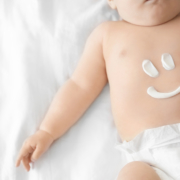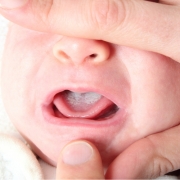
Article at a Glance

Thrush is a common infection of the mouth and tongue caused by yeast. An infant with this infection will have white patches on the inside of the lips and cheeks which will not rub off. Untreated thrush can lead to a severe diaper rash caused by the same yeast or yeast infection of mom’s nipples … Continue reading “Thrush”

Newborn and infant skin is very sensitive, and rashes are common. Normal rashes include: Heat rash—a fine red rash mostly seen on the upper chest and diaper area. Avoid over wrapping your baby and use fragrance-free lotion if the skin is dry. Erythema Toxicum—red blotches with tiny white bumps in the center. It appears a … Continue reading “Skin”

Breastmilk and formula provide all the nutrients a child requires during the first months of life. The introduction of solid foods must be individualized to a child’s needs. It is recommended that solids be initiated between four and six months of age when readiness cues are seen (such as watching you eat intently or grabbing … Continue reading “Eating Solid Foods”

A diaper rash usually consists of redness or small bumps on the lower abdomen and diaper area that have direct contact with the soiled diaper. A rash of this type is rarely serious and usually clears in three or four days. For care: keep the skin clean and dry apply a diaper rash ointment or … Continue reading “Diaper Rash”